You got a job offer!
But wait… Your stomach feels funny. Your head says ‘Take it’ but your gut says ‘Run away!’
That feeling might be because the salary is $15,000 lower than your current position, the hiring manager made an inappropriate comment during your second interview, the 90-minute commute each way would eat up three hours of your day, the role advertised ‘strategic leadership’ but the actual responsibilities are purely administrative.
Whatever the reason, this happens all the time.
Companies deal with declined offers regularly.
When you realize you’re not the first person declining an offer, and certainly won’t be the last, the embarrassment of saying “no” lessens considerably.
In this blog, we’ll cover the importance of declining a job offer professionally, how to decline offers over email, phone, and even after accepting them, how AI can help write the perfect response, and so much more.
Let’s go!
Why You Might Need to Decline a Job Offer
The reasons for turning down an offer usually fall into two categories.
# 1 – Logical Reasons
They’re based on facts. You know they don’t work for you.


Never Worry About AI Detecting Your Texts Again. Undetectable AI Can Help You:
- Make your AI assisted writing appear human-like.
- Bypass all major AI detection tools with just one click.
- Use AI safely and confidently in school and work.
For example,
- The salary is too low.
- The role isn’t what you expected.
- The company culture feels off.
Then there are other types of reasons…
# 2 – Emotional Reasons
These reasons are valid, but they shouldn’t be the reason you say yes to a job that doesn’t fit.
For example,
- The hiring manager seemed so nice.
- You don’t want to disappoint them.
- You feel guilty because they picked you over someone else.
The decision should be made out of logic, and not any other emotion.
But sometimes, we do feel completely torn after declining a job – which is completely normal.
The fear can be of missing out – aka FOMO.
- What if this is the best offer you’ll get?
- What if nothing better comes along?
This fear of missing out is real and can make you want to say yes even when something doesn’t feel right.
The other is fear of making the wrong choice.
- What if you take this job and hate it?
- What if it ruins your career path?
These worries are normal too.
Both fears pull you in opposite directions. Understand that declining an offer is a decision, not a mistake.
Most people don’t take the first offer they get.
People change jobs more than ever before. Companies understand this.
But it’s better to decline now than to take a job you’ll quit soon.
That wastes everyone’s time. Being honest now is actually the respectful thing to do.
Common Reasons for Turning Down a Job Offer
Declining an offer doesn’t mean you’re being picky – it means you know what’s right for you.
Here’s why people say no, and why it’s okay if you do too.
- The Salary Doesn’t Match the Market (Logical + Practical)
You did your research.
You know what someone with your skills and experience should be making. But the offer is not even close.
Companies have budgets, but so do you.
If the salary doesn’t align with industry standards – and they won’t negotiate – walking away is sometimes the smartest move.
- A Better Offer Comes Along (Logical + Strategic)
You’re not choosing between a job and no job.
You’re choosing between this job and other options.
If another company offers better pay, benefits, or career growth, it makes sense to compare before committing.
Here’s a comparative analysis framework…
- Compensation – salary, bonuses, stock options
- Benefits – Healthcare, retirement, PTO
- Growth – Career path, mentorship, training
- Culture & Work Environment – Leadership style, team dynamics
- Work-Life Balance – Flexibility, hours, remote options
If one offer significantly outweighs the other, the decision becomes clear.
- It Just Doesn’t Feel Right (Psychological + Emotional)
The interviews went well, but something felt… off.
Maybe the company values hustle culture over employee well-being.
Maybe the team dynamic seemed tense. Maybe the hiring manager’s leadership style clashed with yours.
A bad cultural fit can make even a high-paying job unbearable. If you sense red flags now, trust your gut.
- The Commute (or Relocation) Problem (Practical + Lifestyle)
If the location is draining you, you can reconsider the offer.
A long commute affects your energy, health, and overall happiness.
A study by the University of West of England found that every extra 20 minutes of commuting per day has the same negative impact on job satisfaction as a 19% pay cut.
- Work-Life Balance Matters More Than Ever (Emotional + Psychological)
If you don’t want that “always being on” model which most companies glorify, you can say no.
A job that pays well but burns you out isn’t worth it. Choose a job that lets you enjoy both your career and your life.
- Limited Career Growth (Logical + Long-Term Thinking)
If the role has no clear path for advancement, it could slow your long-term career progress.
Ask yourself these questions. If the answer is “yes” – go for it.
- Will I learn new and valuable skills?
- Is there a clear promotion track?
- Will this position make me more valuable in 2-3 years?
If the answer is no, you might be settling rather than growing.
The Importance of Declining a Job Offer Professionally
When declining a job offer, you’re either:
- Building a bridge – Keeping doors open, maintaining goodwill, and leaving on a positive note.
- Burning a bridge – Damaging your reputation, and closing off future roles.
Turning down a job offer is your right, but doing so professionally is just as important.
Not only does it keep the doors open for you in the future, but it ensures mutual respect between you and the hiring manager.
Showing professionalism is good for you and the company.
Why it’s better for you – Just because this role isn’t the right fit now doesn’t mean the company won’t be a great option later.
Maybe the salary wasn’t ideal, but what if they reconsider for a better role down the line?
Why it’s good for the company – Everyone deserves clear communication and respect.
The world travels fast – hiring managers switch companies, and recruiters work across industries.
A burned bridge today could cost you a major opportunity tomorrow.
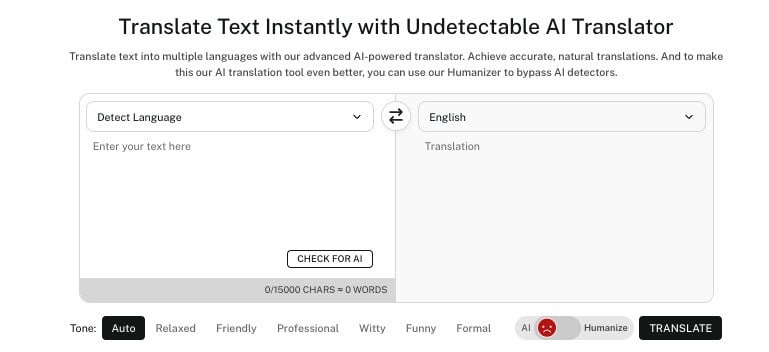
This risk is amplified when dealing with global firms where professional etiquette varies by region. If you are communicating with an overseas team, you can include our Undetectable AI’s Translator to find the most culturally appropriate ways to describe your soft skills and reasons for declining to international recruiters.
This ensures your message isn’t just linguistically correct, but also strikes the right tone of respect required in different professional cultures.
For example, A software engineer once declined an offer rudely and dismissed the company as “not worth his time.” A year later, he applied to a different company – where the same hiring manager had just taken a new role. He didn’t even make it to the first interview.
You would like to avoid this situation at any cost.
How to Decline a Job Offer Politely (Step-by-Step Guide)
Here’s a simple and structured way to say “no” without burning bridges.
Step # 1 – Respond within 24-48 hours of making your decision. The sooner, the better.
Step # 2 – Thank the employer for their time, effort, and the opportunity.
Step # 3 – Don’t explain the reason for your decision because too much information can open unnecessary debates.
Step # 4 – End with another note of appreciation.
Step # 5 – If the company or role was appealing but not the right fit now, leaving the door open could lead to future opportunities.
You can simply ask the AI Chatbot: “How to decline a job offer professionally”
Output:
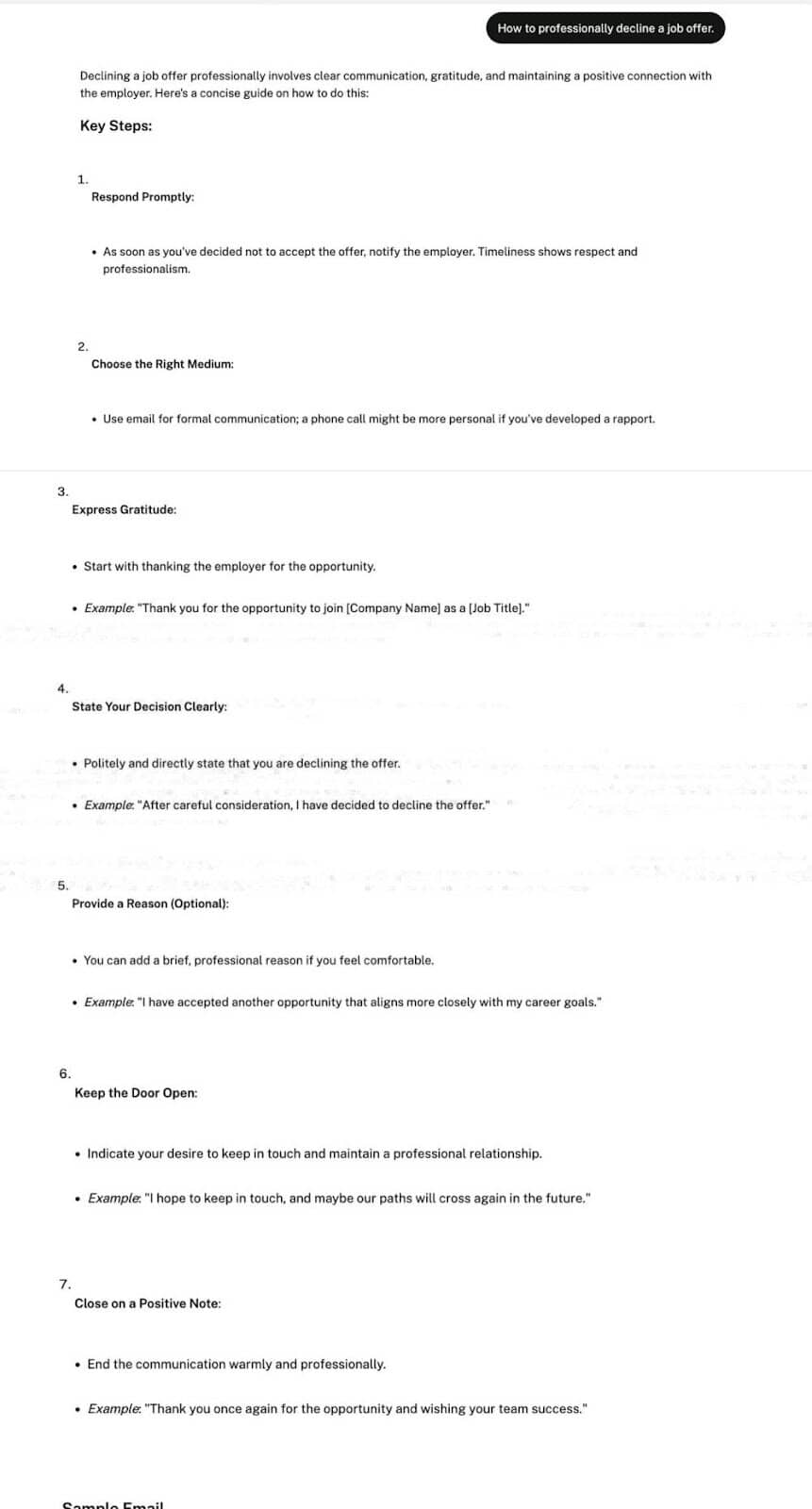
How to Decline a Job Offer via Email (With Sample Emails)
Emails are the best way of communication – your embarrassment is not highlighted, and your ashamed face is not visible.
The length of the email shouldn’t be more than 2-3 paragraphs and make sure you’ve included all of these components:
- Subject Line
- Appreciation
- Decision
- Reason
- Future Connection
- Tone Consideration (professional yet warm)
1 – Declining due to another offer
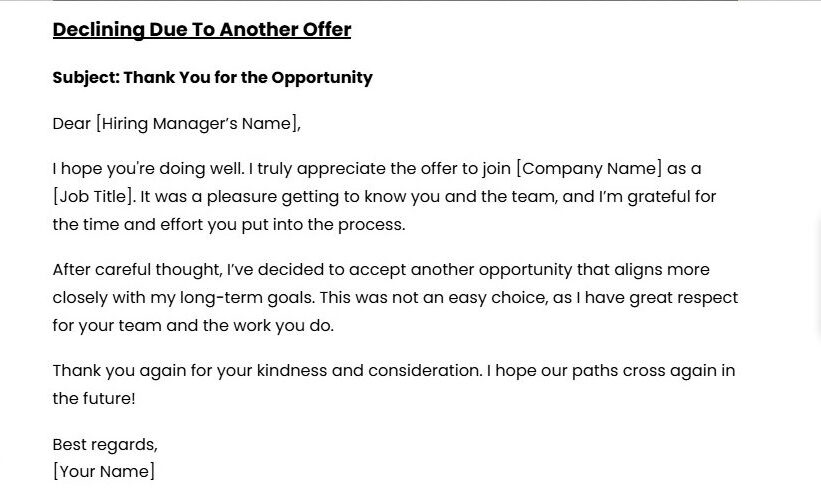
2 – Declining due to compensation
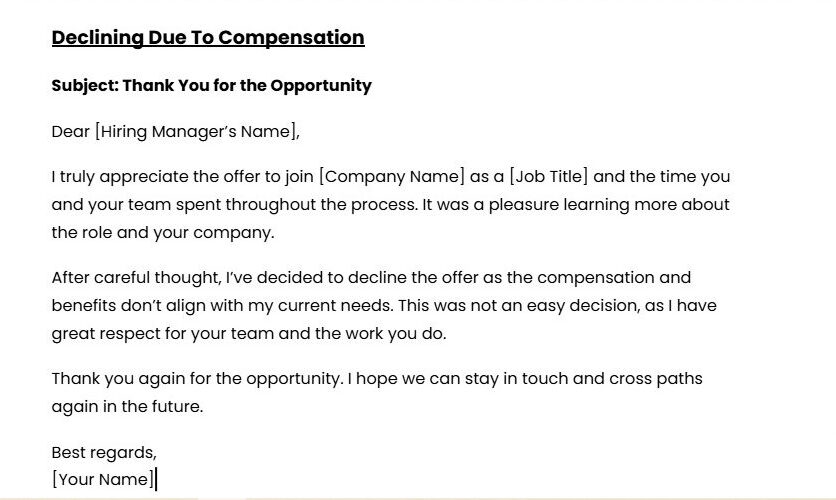
3 – Declining due to role mismatch
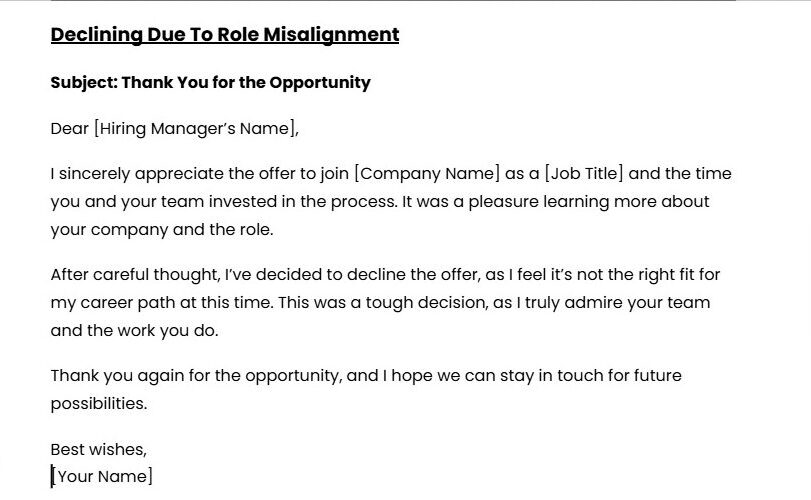
4 – Declining due to personal reasons
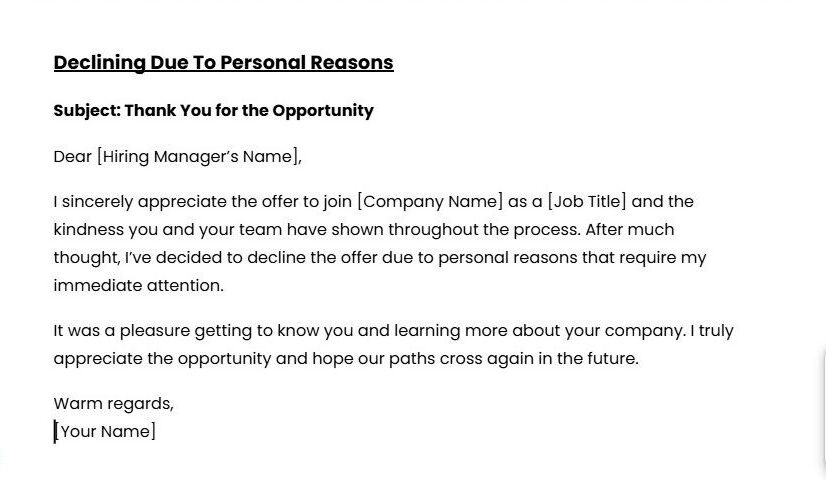
5 – Declining the offer with interest in future opportunities
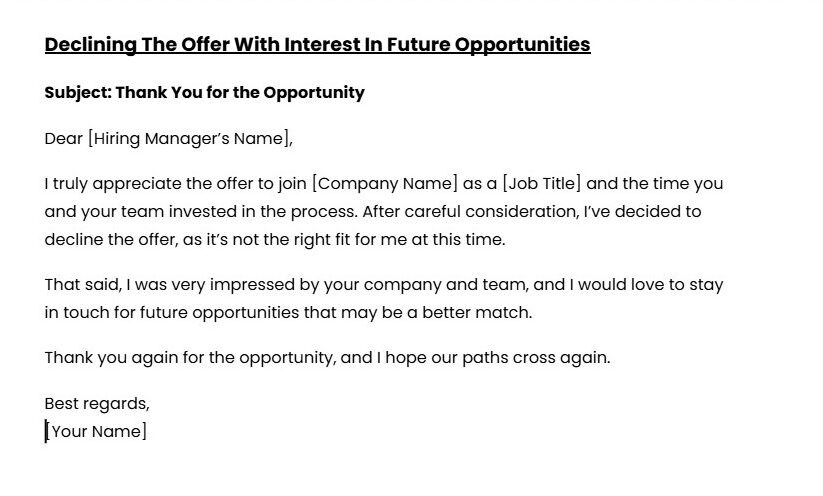
How to Decline a Job Offer Over the Phone
A quick call, a little gratitude, and a clear (but kind) “no-thanks” will do the trick.
Take a look at these easy scripts to make the conversation smooth and stress-free!
Script 1 – Being Honest About Another Offer
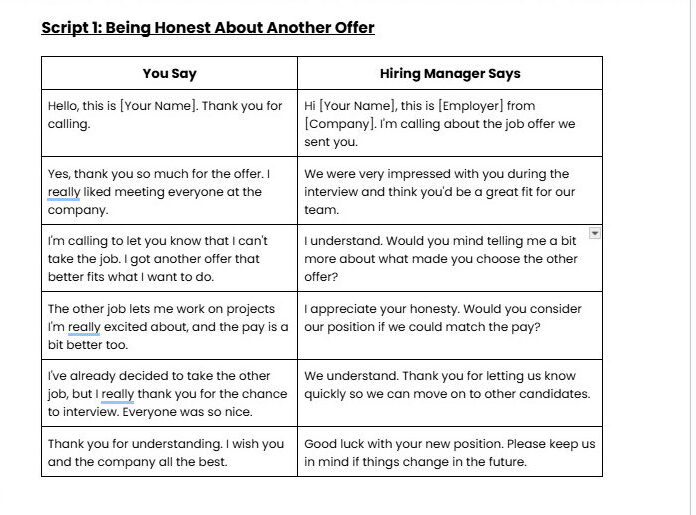
Script 2 – Declining Because of Another Offer
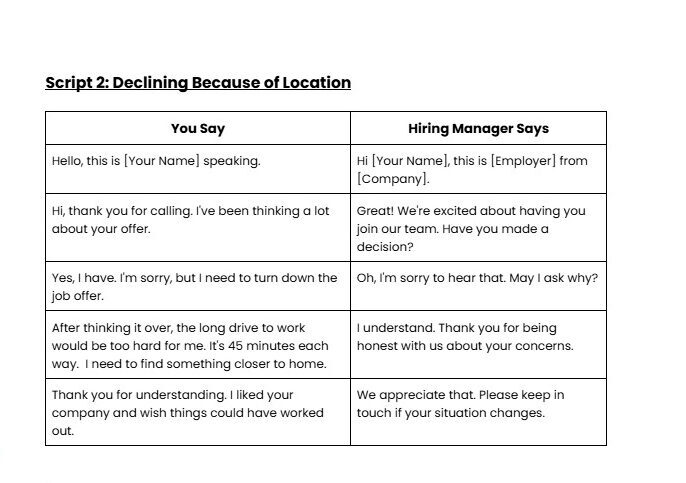
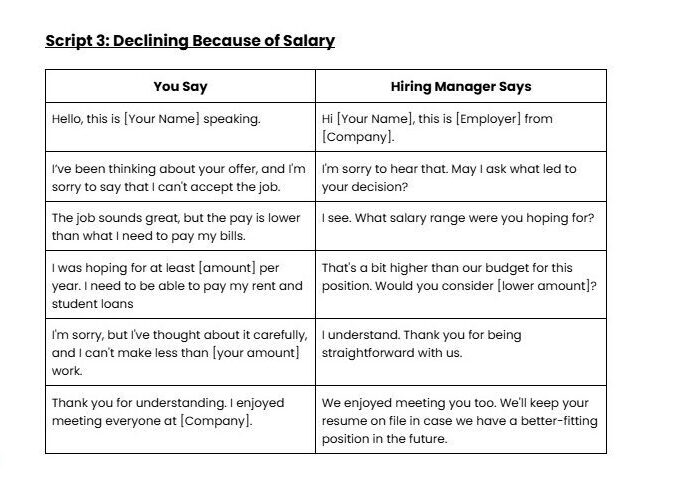
How to Decline a Job Offer After Accepting (With Example)
Backing out after saying “yes” carries significant emotional weight. You feel guilty, anxious, and worried about burning bridges—these feelings are normal but shouldn’t prevent you from making the right career decision.
The Right Approach
- Call first
- Follow up with an email
- Be direct but brief
- Express genuine regret
- Remain professional
Take a look at these samples.
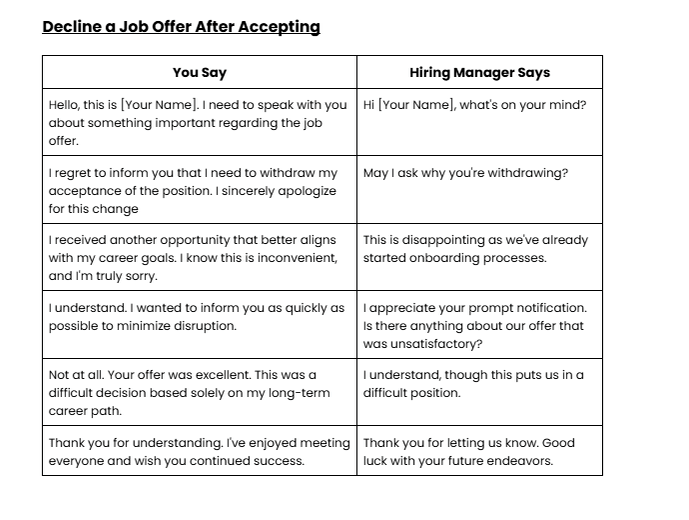
Follow up Email Sample
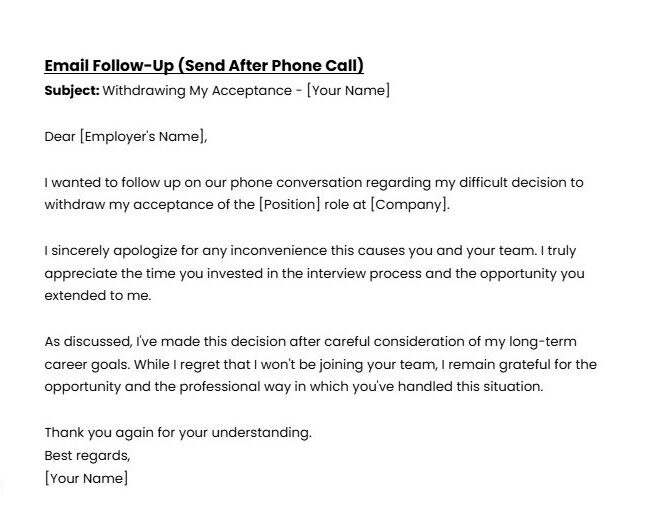
How AI Can Help You Craft the Perfect Job Offer Decline Email
Writing a job offer rejection email is stressful.
You may be worried about sounding ungrateful, burning bridges, or coming across as unprofessional.
But don’t worry, AI can help you simplify the process.
- Write In the Right Tone
Let AI assess the tone of your email, and ensure that it’s professional, respectful, and appreciative.
This prevents the emails from sounding too blunt, cold, or overly apologetic.
That’s where the AI Email Generator comes in. It helps you quickly write respectful, professional decline emails by asking for your intent, tone, and a few details—then generating a polished message you can easily tweak.
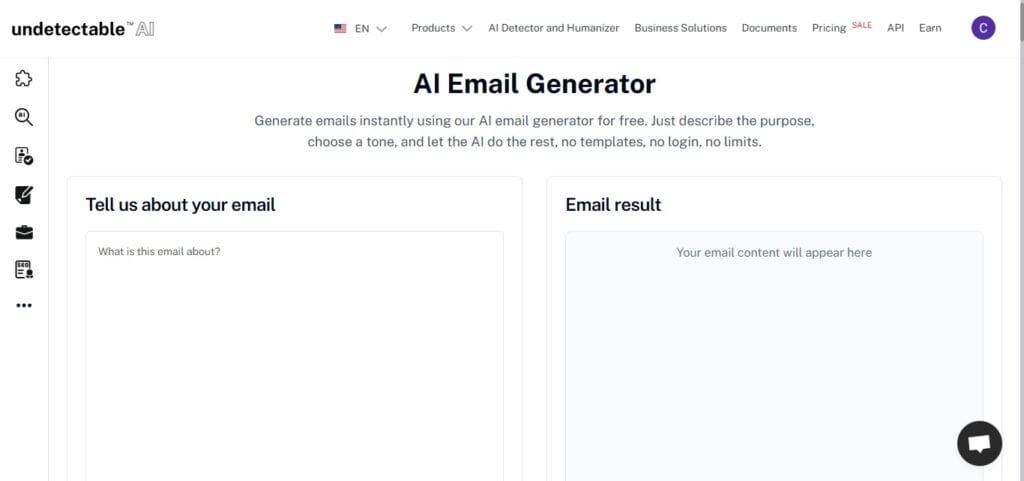
Whether you’re turning down a role due to salary, culture, or timing, this tool ensures your message sounds thoughtful and well-composed.
- Write in A Personalized Way
Instead of using generic rejection templates, ask the AI Chatbot to create a personalized email based on your scenario.
You can add the snippets of your interview experience, and the specific moments and discussions you had with the hiring team.
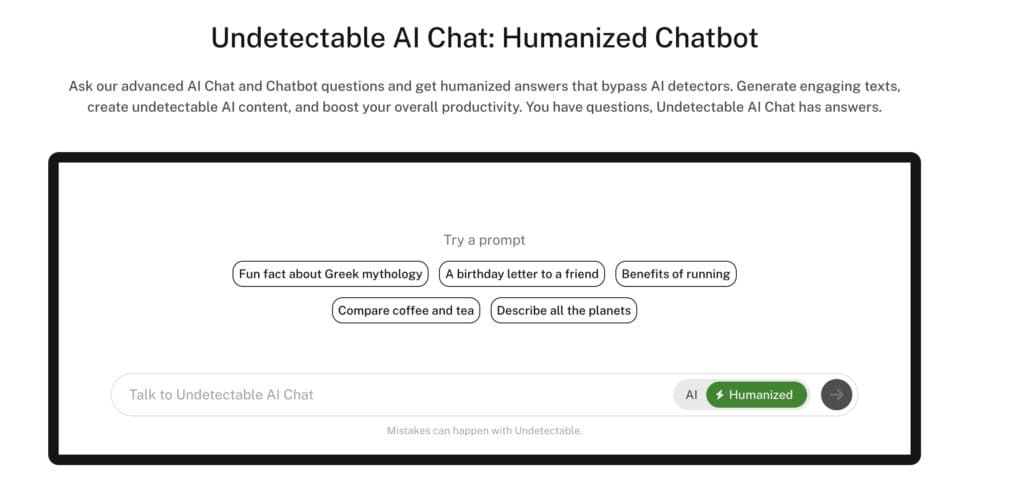
- Add Professional Phrasing
Paraphrasing tool will help you in finding the perfect sentence type that will present you as a polite and professional person.
For example,
Instead of: I’m rejecting the offer because I got a better one.
Better: I’ve accepted another opportunity that aligns more closely with my goals.
- Add Emotional Intelligence Elements
AI can help soften the message by adding elements of gratitude, future connection, and professionalism, ensuring your rejection doesn’t burn bridges.
Explore also our AI Detector and Humanizer conveniently in the widget below!
FAQs About Declining a Job Offer
How Do I Politely Decline a Job Offer?
Tell them fast. The sooner you say no, the better. Thank them for their time and say how much you liked meeting them.
Be clear but nice when you say no. You can call for big jobs but emails work for most jobs.
Should I Give a Reason for Declining a Job Offer?
It’s good to give a simple reason as it shows respect. Don’t share too many details – keep it short. You can also give valuable feedback if you don’t like anything about the company or job.
Be honest but think about what’s smart to share. Sometimes, a simple “It’s not the right fit” is enough.
Can I Decline a Job Offer After Accepting It?
This is risky as it might upset the company and hurt your name in the field.
Think about why you’re changing your mind. Ask yourself if the new job is better or if you’re just scared of change.
What If I Want to Work for This Company in the Future?
Stay in touch. A LinkedIn study shows that 70% of people get jobs through connections. So you know how important they are digitally as well.
Connect on LinkedIn and check their posts sometimes. Send a personalized message once every three months.
Conclusion
Saying no to a job is part of your work journey. Your career is long, and the people you meet today might help you tomorrow.
Maybe add a quick thank-you note.
Or maybe doodle a smiley face? (Okay, not this.) But keep them in the loop and don’t make them forget you.
Ask yourself:
- Did I make this choice because I want something different, or am I just scared of new things?
- What cool stuff did I learn from these people?
- How can I keep them as friends without making it weird?
And the biggest question:
- What kind of job would make me jump out of bed in the morning?
Your dream job is playing hide and seek. Keep looking! This “no” just means you’re one step closer to the big “YES!”
